
As spring arrives, it's the perfect opportunity to refresh your home – not just by decluttering or cleaning but by doing a full-scale 'expiration sweep'.
Many everyday household items have a shelf life, and using them past their prime can lead to reduced effectiveness, unpleasant odors, or even health risks.
From pantry staples to beauty essentials, when it comes to the best decluttering tips, checking expiration dates to clear out anything past its best is an excellent place to begin and what better time than spring?
1. Pantry foods

Your kitchen pantry is one of the most important places to check for expired items. Dry goods like flour, rice, and pasta can last a long time but may develop an off taste or attract pests if stored too long or improperly.
Sherri Papich, professional organizer and CEO of Organize Your Life, says, 'Expired pantry foods may lose their nutritional value, while oils and nuts can become rancid. Spices lose potency over time, leading to bland cooking. In worst cases, expired goods can develop mold or harmful bacteria.
'For expired dry goods, compost what you can (like grains and spices) and recycle clean, empty containers. Oils should never be poured down the drain – check if your community has a cooking oil recycling program. Avoid donating expired foods, as food banks require unexpired items.'
You can easily get rid of cooking oils safely with expert tips from our dedicated guide.
Audra George, owner of Oklahoma-based Pretty Neat, says, 'To ensure food doesn't get past its prime, I recommend a food and pantry clean-out every few months. But the best solution lies in looking ahead – food planning, and choosing sensible storage solutions, like this iDesign Linus Expandable Cabinet & Spice Organizer from The Container Store, which displays the cans so you can clearly see what you have.'
Lazy Susans and over-the-door organizers are among the other pantry organizers professionals always buy.
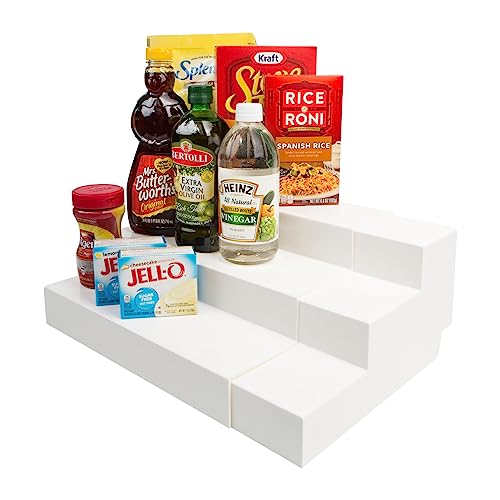
Professional organizer Sherri Papich recommends these tiered shelves so that you can easily see items deeper in the cabinet. Handily, it expands in both width and height to fit most cabinets. She says, 'A tiered shelf helps maximize space and ensures food items don’t get lost in the back. This option adjusts to fit different cabinet sizes.'
2. Cleaning products
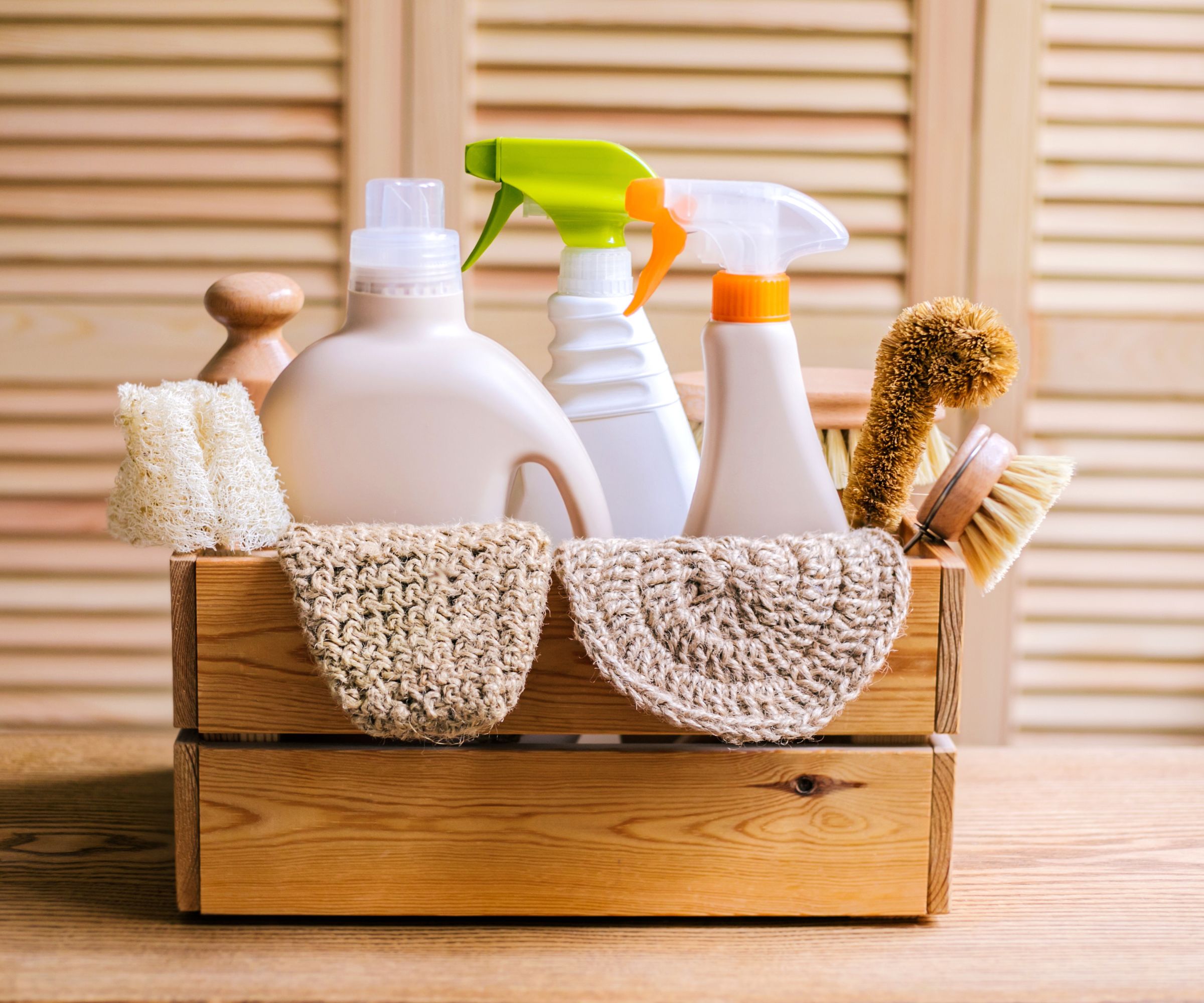
It’s easy to assume that cleaning products last forever, but many have expiration dates that impact their effectiveness.
Karina Toner, operations manager at Spekless Cleaning, says, 'This category includes everything from all-purpose cleaners, disinfectant sprays, sanitizing wipes, and bleach-based solutions. Over time, the active ingredients degrade, making them less effective at killing germs, bacteria, and viruses. Some can even become hazardous – bleach and ammonia-based products can break down into irritating or even toxic compounds, while aerosol cleaners can lose pressure or leak, causing chemical burns or inhalation hazards.'
Disinfectants and antibacterial sprays can weaken over time, meaning they may no longer kill germs as intended. Bleach loses its potency after about six months, while expired laundry detergent can become clumpy and less effective at breaking down stains. If you notice a change in consistency, smell, or color, it’s best to replace your essential cleaning supplies.
Toner continues, 'When it comes to disposal, never pour harsh chemicals down the drain – they can corrode pipes or harm water treatment systems. Check labels for specific disposal instructions. Many cities have hazardous waste disposal programs for chemicals like bleach, ammonia-based cleaners, and aerosol cans.'
For a more sustainable cleaning armory, our cleaning pros advise making your own everyday cleaning spray. Mix equal parts Great Value Distilled White Vinegar from Walmart and water, plus a dash of Dawn Platinum Ez-Squeeze Dish Soap from Target. These Teyssor Spray Bottles from Amazon are ideal.
Whether creating your own glass cleaner or opting for commercial sprays, look to avoid harsh chemicals.
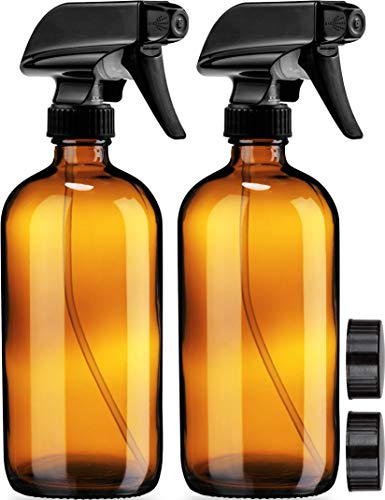
Cleaning pro Karina Toner recommends this two-pack of glass spray bottles, which offer UV protection and come with editable labels. She says, 'These bottles allow you to create homemade cleaning solutions that last longer and avoid plastic waste.'
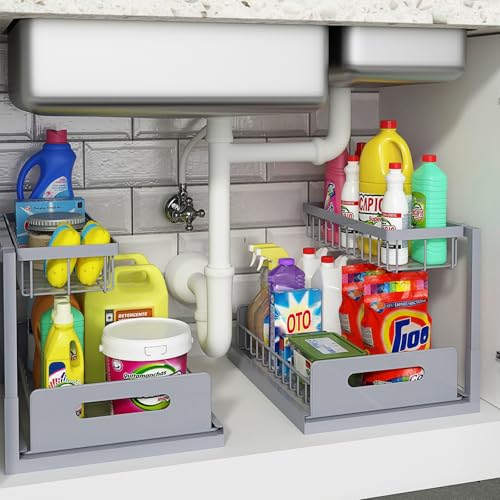
This multi-purpose under-sink organizer pulls out for easy access to your products. Great for storing cleaning products in the kitchen or bathroom, the L-shaped design with a narrow top and wide bottom leaves space for plumbing and garbage disposal, maximizing the vertical space of the sink. The sliding drawer with handles, can be pulled out smoothly, allowing you to easily access the items stored at the bottom.
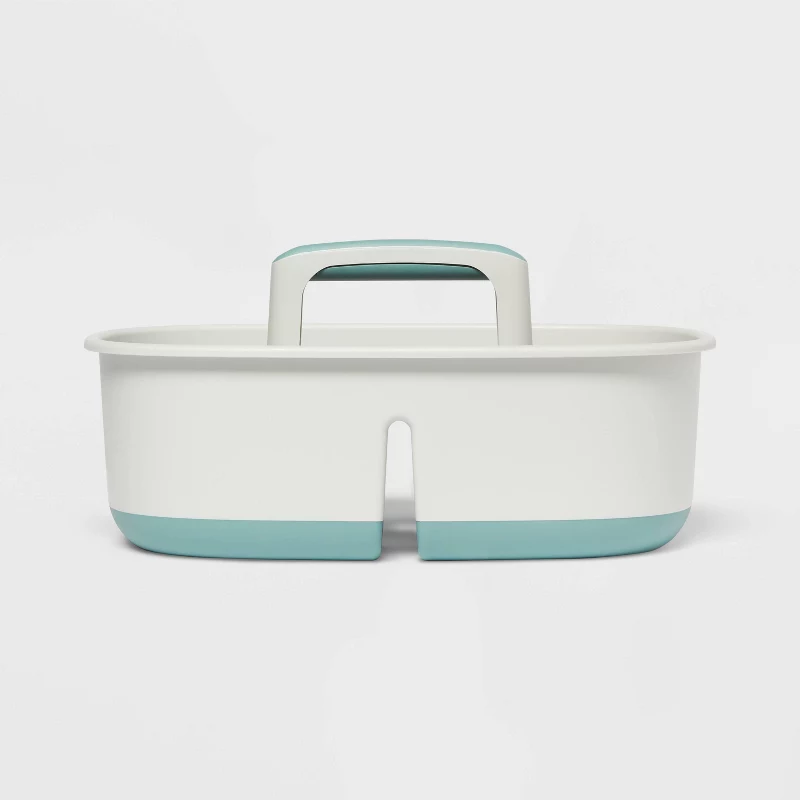
Designed with a non-slip base and handle, this handy caddy holds eight or more standard spray bottles, allowing you to move your key cleaning products easily around the home, and making it less likely they end up gathering dust and passing by their expiry date at the back of a cupboard.
3. Medicines
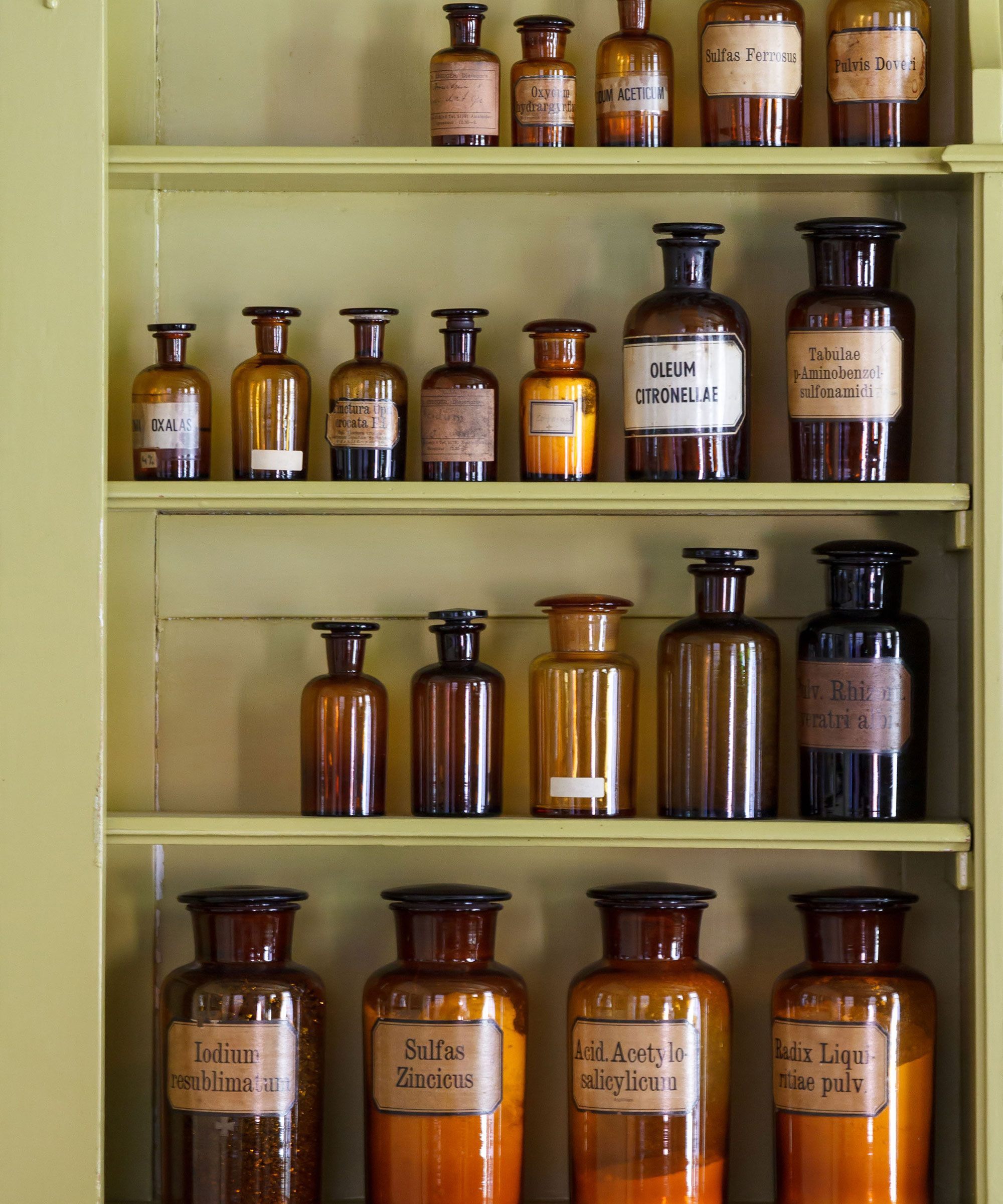
Expired medications can lose potency or even become harmful, making it crucial to check your medicines and declutter your bathroom cabinet regularly. Pain relievers, cold medicines, and prescription drugs should all be examined for expiration dates.
Wells Ye, founder of Fresh Tech Maid, says, 'Expired medicines lose their effectiveness – you may think that you are getting the treatment, but in reality, the medicine will not be effective at all, and could even harm you. Some drugs like the bacterium tetracyclines change form after expiration to become hazardous materials.'
Professional organizer Amélie Saint-Jacques says, 'Checking your medicines haven't expired is particularly important if you have a baby or young child and want them to get the right dosage of acetaminophen or ibuprofen, or if you have life-saving medications like insulin or epinephrine and really do need them to work as intended! Take any expired medications back to your pharmacy for proper disposal.'
Consider looking into the ways professionals organize their medicine cabinet for more handy tips.
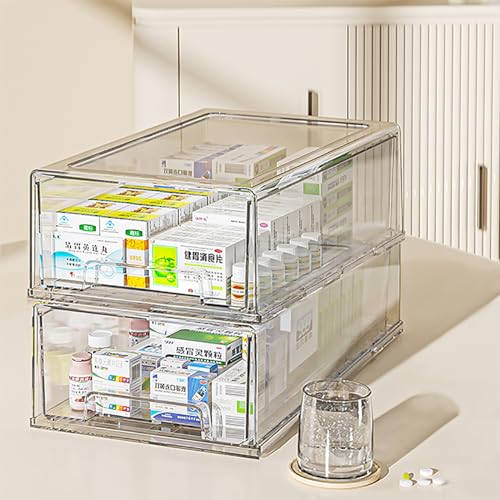
Professional organizer Amélie Saint-Jacques recommends these handy organizer drawers, which come in a pack of two, for storing but providing easy access to your medicines. Lightweight and easy to transport, having different drawers means adults' and children's medicine can be stored in different areas for easy identification. Keep them all away from heat, humidity and sunlight.
4. Beauty products

Your cosmetics and skincare products don’t last forever, and using them past their expiration date can lead to irritation or bacterial growth.
Papich says, 'Old makeup and skincare can harbor bacteria, leading to breakouts, skin irritation, or infections. Expired sunscreen loses its UV-blocking power, putting you at risk for sun damage.
'Mascara, lipstick, and other cosmetics should go in the trash rather than recycling due to mixed materials. For skincare bottles, check if they are recyclable – many brands offer take-back programs. Avoid flushing liquids or creams down the sink, as they can contain ingredients harmful to water systems.'
A good rule of thumb: if a product has changed in smell, texture, or color, it’s time to toss it.
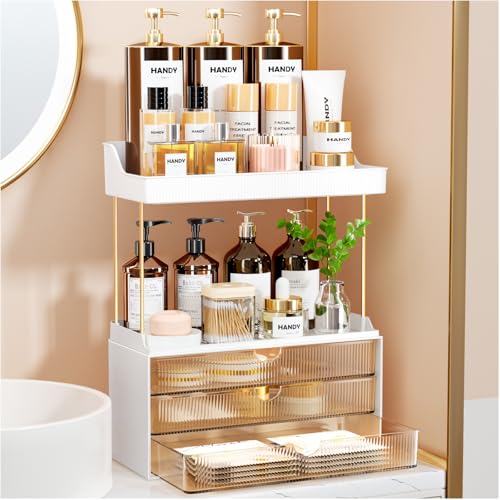
Professional organizer Sherri Papich recommends this two-tier makeup organizer that's so easy to set up it can be done in less than a minute. She says, 'Keeping your products neatly stored – and visible – helps ensure you use them before they expire. This acrylic organizer is stylish, easy to clean, and perfect for categorizing beauty products.'
Meet the experts
FAQs
Do air fresheners expire?
Yes, air fresheners can expire, especially aerosol sprays and plug-in refills. Over time, their scent can weaken, and the propellant in spray cans may lose effectiveness, leading to poor dispersion.
Toner says, 'Aerosol air fresheners can become pressurized hazards if they expire, leading to leaks, weak sprays, or even dangerous bursts, while scented oil diffusers and sprays can degrade, losing their fragrance and possibly developing an off-putting smell. Some essential oil-based fresheners can also go rancid.
'For aerosol cans, empty them completely before recycling (shake and spray until nothing comes out). If there's still liquid inside, take it to a hazardous waste disposal site. For old wax melts, re-purpose them as fire starters for fireplaces or camping.'
Does laundry detergent go bad?
Laundry detergent doesn’t necessarily “expire” in a harmful way, but it can lose effectiveness over time.
Toner says, 'Liquid detergents can separate into their chemical components, making them less effective. They may even grow bacteria or mold if exposed to moisture. Fabric softeners thicken over time and can clog washing machine dispensers, leading to buildup and residue on clothes. Powdered detergents absorb moisture and harden into clumps, making them difficult to dissolve properly in water.
In terms of disposal, pour liquids down the drain with plenty of running water to dilute them, so long as this meets advice on the label. However, do not pour large amounts at once – this can cause buildup in pipes. Recycle plastic detergent bottles after rinsing them out. For dried-out powders, check if your local waste management accepts them in the regular trash.'
How should I dispose of expired household products?
Disposal methods depend on the type of product. Expired food can often be composted, while cleaning supplies should never be poured down the drain unless specifically labeled as safe for disposal that way.
Medications should be taken to a pharmacy or designated take-back program to prevent contamination of water sources. For beauty products, empty containers can often be recycled, but check local guidelines for specifics.
So there you have it – all you need to know for a thorough 'expiration sweep' of your home. Spring cleaning isn’t just about tidying up – it’s also about making sure everything in your home is safe and effective.
Next, learn the things you should be storing in drawers, according to professional organizers, and how to dispose of household appliances after your spring decluttering session.







